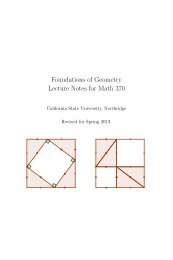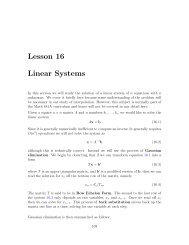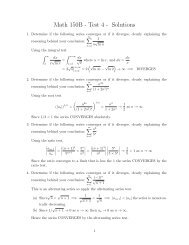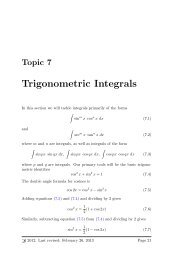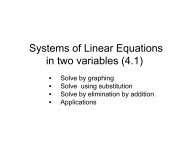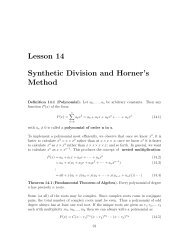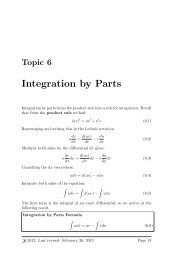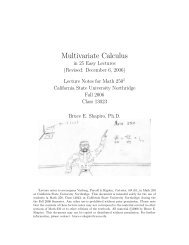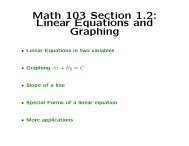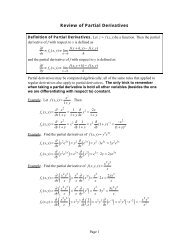The Computable Differential Equation Lecture ... - Bruce E. Shapiro
The Computable Differential Equation Lecture ... - Bruce E. Shapiro
The Computable Differential Equation Lecture ... - Bruce E. Shapiro
Create successful ePaper yourself
Turn your PDF publications into a flip-book with our unique Google optimized e-Paper software.
154 CHAPTER 8. BOUNDARY VALUE PROBLEMS<br />
We will modify the Euler program slightly to take the number of mesh points and<br />
the two boundary points – rather than the step size – as parameter. This is because<br />
we want to force the problem to stop at the second boundary point. <strong>The</strong> following<br />
code will return a single Euler solution for the variable u (we don’t really care about<br />
v since it was not in the original problem).<br />
EulerIVP[f , ya , a , b , n ] :=<br />
Module[{ t, y, h, solution},<br />
h = (b - a)/n;<br />
solution = {{a, ya[[1]]}};<br />
y = ya;<br />
For[t = a, t < b, t += h,<br />
y = y + h*f[t, y];<br />
AppendTo[solution, {t + h, y[[1]]}];<br />
];<br />
Return[solution];<br />
]<br />
Suppose we want to estimate the solution using a mesh with 100 intervals. <strong>The</strong>n<br />
our first guess would be obtained with<br />
f[t , u , v ] := {v, u/(t*t) - v/t}<br />
EulerIVP[f, 1, 0, 1, 2., 100]<br />
which will return<br />
{{1, 1}, {1.01,1}, {1.02, 1.0001},...,{2.,1.25041}}<br />
where the intervening values have been omitted. <strong>The</strong> very last value is what we are<br />
interested in: our first guess gives u(2) (0) = 1.25041. Our goal is to iterate on this<br />
value: if we have two guesses at c and the corresponding two guess at u(2), we can<br />
use linear interpolation to make a third guess:<br />
m (i) = u(b)(i) − u(b) (i−1)<br />
c (i) − c (i−1) (8.9)<br />
c (i+1) = c (i) +<br />
u(b) − u(b)(i)<br />
m<br />
(8.10)<br />
<strong>The</strong> problem is that we don’t have a good second estimate for c, so we pick one<br />
arbitrarily, namely<br />
c (1) = c (0) + 1 = 1 (8.11)<br />
<strong>The</strong>n<br />
returns<br />
EulerIVP[f, 1, 1, 1, 2., 100]<br />
{{1, 1}, {1.01,1.01}, {1.02, 1.02},...,{2.,2}}<br />
Math 582B, Spring 2007<br />
California State University Northridge<br />
c○2007, B.E.<strong>Shapiro</strong><br />
Last revised: May 23, 2007




